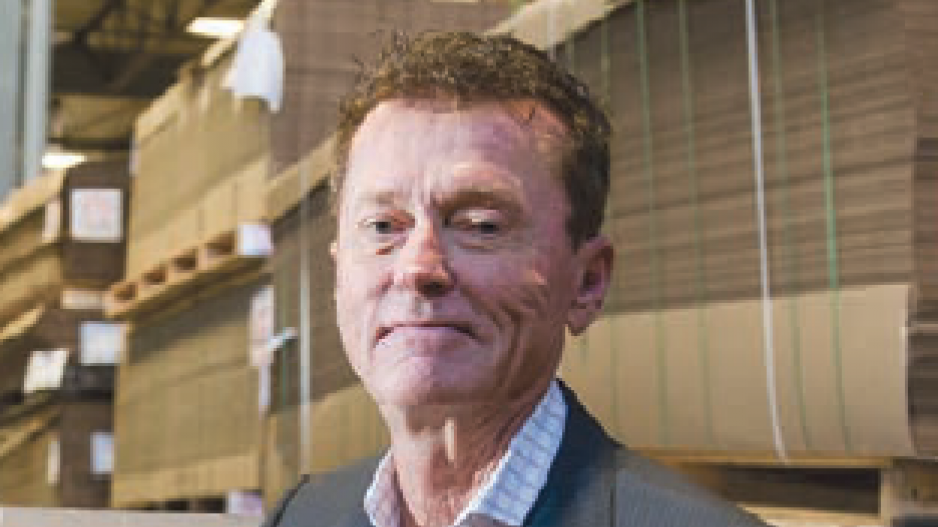Robert Meggy's humble beginnings couldn’t have been more exemplary of life on the West Coast. Now president and CEO of Great Little Box Company, Meggy got his start as a BC Ferries deckhand running the route between Tsawwassen and Swartz Bay.
Even as a teenager, he saw past the cafeteria’s stale coffee and soggy french fries. “It always amazed me: whatever the crew was like, the captain was the same,” Meggy said. “Some were nice; others were not.”
It was a career-defining observation: that the character of the person at the top could influence a whole team. The realization played into his long-held dream of one day running his own company.
After running through a handful of jobs at various manufacturing companies, he decided to part ways with the company he was working for and launch one of his own. “I thought, ‘I can do better myself.’”
So, in 1982, he purchased a 5,000-square-foot cardboard manufacturing company that was in receivership. Within a year the company went broke.
Not one to abandon ship, he dug in and looked for a way to turn things around. He hired a talented salesman and began to build a customer base. Before long he started turning a profit.
Meggy religiously cycled the company’s profits back into its growth, and over the ensuing years he acquired a number of related companies. “We bought a shipping-room supply company, a label-manufacturing company, a folding-carton company, a foam-manufacturing company.”
The company’s growth was substantial and steady. Today, it has distribution hubs in Victoria, Kelowna, Edmonton, Calgary and Everett, Washington, and is now 250 employees strong. Headquartered in a 250,000-square-foot facility in Richmond, it processes a few hundred thousand boxes and a million labels each day.
Situated next to the Fraser River, the facility has a sand volleyball court and a gazebo – accoutrements meant to facilitate socializing and the development of community within the company.
To accomplish this, Meggy believes it is critical to place a high value on the needs and wants of his employees, and first on his list are recognition and appreciation. Every month he takes 15% of the profits and splits it evenly among all employees, irrespective of seniority, position or salary.
“We meet with all the employees each month and share all the financials. We’re open book; everyone gets to see the income statement and balance sheet for each month.”
The initiative has built substantial buy-in. “When I started that, people began to care so much more about the company,” he said.
He also sets an annual goal for company profits. If the goal is met, he takes the whole company on vacation together, either to Las Vegas or Mexico. “We split every department in half and take turns going.”
James Palmer, vice-president of sales and marketing, said the company’s drive to achieve customer satisfaction can be traced from the employees back to Meggy.
“In order for your staff to be engaged to do that, they have to love to come to work, and enjoy the company,” Palmer said.
He described Meggy as honest, driven, deeply intuitive and assiduous. “He loves to measure everything, and he holds everyone accountable.”
He also likes to be challenged, said Palmer. “He’s never status quo.”
Palmer also described a structured parking system devised by Meggy that reflects seniority and customer performance. There are sections for both 20- and 30-year employees and prime spots that rotate among those recognized by co-workers for exemplary conduct. Meggy himself does not have a special parking space.
“The biggest thing for me is always people,” said Meggy, who flies flags for each of his employees’ country of origin. “We have all the stuff that people would want in a company.” •
Q&A
What sorts of character traits or leadership styles do CEOs have to cultivate in the 21st century?
Communication skills are becoming more important all the time. CEOs must build relationships with their staff, listen to their staff and communicate vision to their staff. I think that communication skills are No. 1 for the 21st-century CEOs.
Of which accomplishments are you most proud?
I am most proud of taking a bankrupt company and building it into a successful operation. Also, I am proud of the major awards we have won: winner of one of Canada’s 50 Best Managed Companies for many years, culminating in permanent status now. We have also been named one of the top 100 best companies to work for in Canada each year for the past 11 years.
What is the biggest challenge you have faced?
The biggest challenge I have faced was a cash shortage when we had just started in business. The 1982 recession was just starting, the company wasn’t yet profitable, cash was tight, and I considered shutting the company down. The decision whether to close or continue was one of the toughest decisions I have ever faced; fortunately, we decided to continue.
What career decisions would you make differently were you starting out today?
I wouldn’t make any different career decision in 2014 than I did when I graduated from university. I started work with a large company, learning procedures and systems; then I moved to smaller companies, in which I gained more overall understanding of business; then I became an entrepreneur, which was always my goal. I would do the same today.
Celebrate exceptional leadership at Business in Vancouver's 2014 BC CEO Awards.




